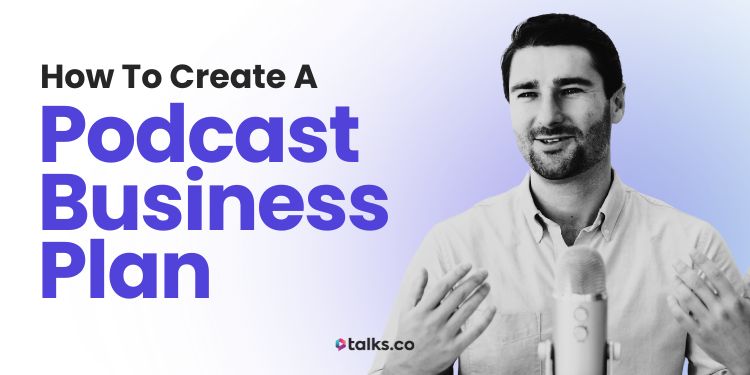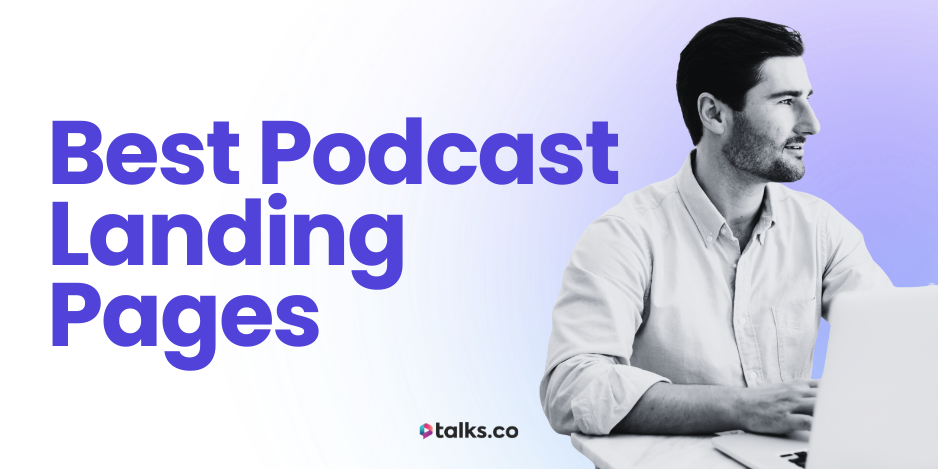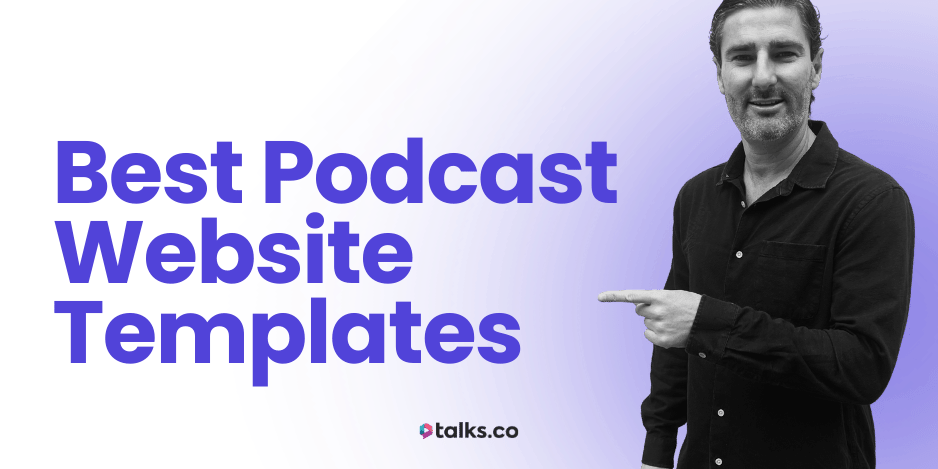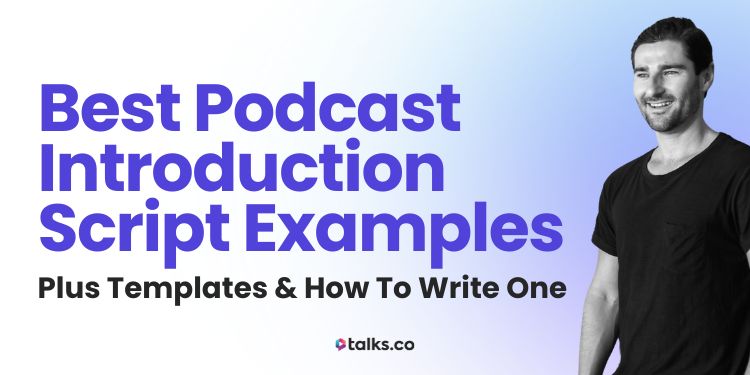What if your podcast wasn’t just content… but your client engine?
Not a hobby. Not just something fun to do with a mic. But a business asset that brings in leads, builds authority, and gives you the kind of visibility that makes people say, “I’ve seen you everywhere.”
That’s what happened once I treated my talk show like a business. A clear plan helped me land interviews with 400‑plus guests, including Anjali Sud, former CEO of Vimeo, and those conversations opened doors to sponsorships, speaking gigs, and high‑ticket clients.
This guide walks you through the exact podcast business plan you need to build a profitable business and make your podcast sustainable, from defining your audience and monetizing your podcast content to getting seen by the right people on all the right podcast directories.
If you’re a coach, author, or consultant who cares more about business growth than just boosting download numbers, you’re in the right place.
Let’s walk through the business side of podcasting and keep it straightforward, practical, and doable. Exactly how a business plan for your podcast should be.
What Is a Podcast Business Plan?

Think of your podcast business plan as the playbook you hand the team before kick‑off. It spells out:
- Purpose: Why the show exists and how it supports the wider business.
- Audience: Who you’re speaking to and the problem you solve.
- Format: Interview, solo, panel, or mixed, plus episode length and release schedule.
- Monetization: Sponsorships, coaching offers, courses, or a mix.
- Marketing plan: How you’ll reach new ears (email, socials, Talks.co, referral swaps).
- Metrics: The numbers that matter: leads, revenue, and listener retention, not just downloads.
- Podcast budget and workflow: Gear, podcast recording software, and the weekly tasks you’ll either handle or outsource.
Write it down, keep it to one or two pages, and review it every quarter. A tight plan keeps you focused when guest outreach, editing, and promotion start fighting for your attention.
How to Start a Podcast Business
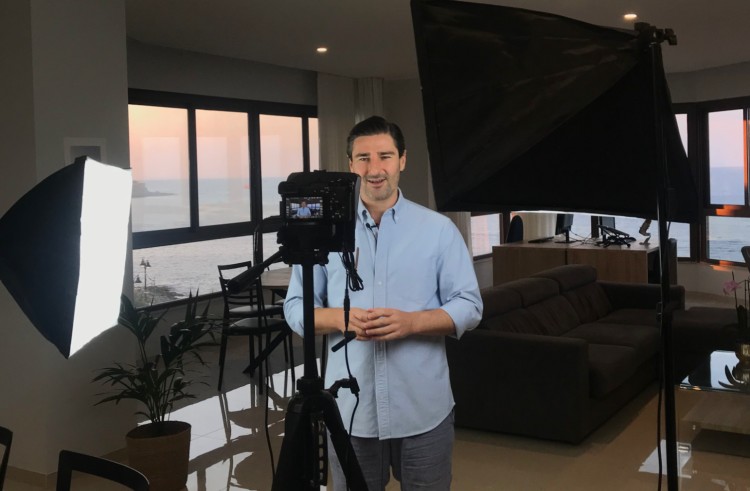
Starting a podcast as a business isn’t the same as launching one for fun. You’re not just chasing downloads, you’re building something that supports your bigger goals: leads, sales, authority, and visibility.
Here’s how to set it up with a business mindset from the beginning.
- Choose a clear niche. Focus on one specific type of podcast group you can serve well, like health coaches, authors, or SaaS founders. General shows get lost in the noise. Niche shows build trust faster.
- Pick a name and brand it. Choose a title that’s easy to remember and immediately tells people what it’s about. Pair it with bold, clear artwork that looks good even when it’s tiny in podcast players.
- Decide on your format and structure. Will it be interviews, solo, or a mix? Plan your intro, content flow, and sign-off so every episode feels polished and repeatable.
- Set up your recording tools. Start with a reliable mic (I still use my Blue Yeti) and remote recording software like Riverside. You don’t need a studio, just clean audio and a simple setup that’s easy to use every week.
- Record test episodes. Do at least two or three trial episodes before publishing. You’ll get a feel for your pacing and tone and spot what needs tweaking.
- Create a smooth guest workflow. Have a simple system for podcast guesting: outreach email, calendar link, prep questions, and a guest release form. It keeps things professional and saves time.
- Launch and promote it like a product. Don’t just hit publish and hope. Share teaser clips of your podcast on social media, email your list, and ask guests to refer you to other shows or potential sponsors.
How to Make a Podcast Profitable
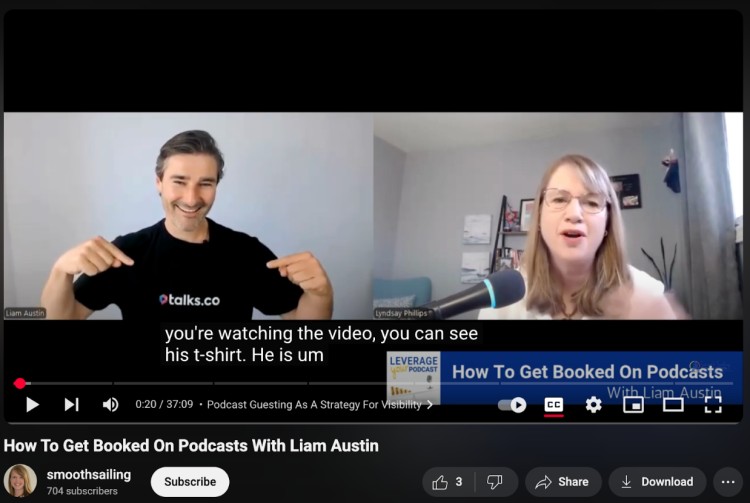
Your podcast doesn’t need millions of downloads to generate real revenue. Focus on turning listeners into leads and strategic relationships into business opportunities. Here’s how to do that:
- Sell your own offers. Use your podcast to drive traffic to a coaching program, course, or consulting offer. Make sure your CTA is clear in every episode.
- Collect leads with a freebie. Offer a valuable lead magnet (like a checklist or guide) and link it in your show notes and outro. Capture emails so you can nurture listeners toward a paid offer.
- Build in partnerships. Interview potential clients, collaborators, or referral partners. Many of my podcast guests became speaking opportunities or long-term business connections.
- Use dynamic ads or sponsored segments. Once your audience grows, you can charge sponsors or run affiliate promos. Keep ads short and relevant so they don’t hurt the listening experience.
- Repurpose your content strategically. Turn episodes into blog posts, social content, and lead magnets. This expands your reach and saves you time creating new content from scratch.
- Track metrics that lead to revenue. Monitor cost per lead, revenue per episode, and conversions, not just downloads. These numbers show what’s actually working.
With the right structure, your podcast becomes more than content. It becomes a system that supports your business week after week.
Podcast About Small Business
A podcast about small businesses can do more than just share tips, it can position you as the go-to expert in your space. Whether you’re offering strategies for solo founders, behind-the-scenes looks at scaling, or interviews with other entrepreneurs, a well-structured show builds authority and trust.
To make it work as a business asset, focus on:
- A niche topic your audience cares deeply about (like local marketing or productized services).
- Consistent, valuable episodes with clear takeaways.
- A direct connection between your episodes and your paid offers.
A podcast gives small business owners something most content doesn’t: long-form trust. And that trust turns into clients.
Podcast Business Plan Template
Use this customizable template to plan your podcast like a business asset, not just a content project.
1. Podcast name
Working title for your show:
[Your podcast name here]
2. Purpose of your podcast
What do you want this podcast to do for your business? Be specific.
[Example: Generate leads for my coaching program, grow authority in the SaaS niche, sell courses, land speaking gigs.]
3. Target audience
Who is this podcast for? Be specific as possible about your podcasts ideal listener.
[Example: Health coaches transitioning into group programs, first-time course creators, mid-level marketers at startups.]
4. Format and frequency
- Format: [Solo | Interview | Hybrid]
- Episode length: [e.g., 20-30 minutes]
- Release schedule: [e.g., Weekly on Tuesdays]
5. Monetization strategy
How will this podcast support your business financially?
[List your revenue channels: course promotion, high-ticket coaching, affiliate links, sponsors, premium content, etc.]
6. Promotion strategy
How will you promote your show to get better podcaster listenership and visibility?
[List channels: Email list, Instagram, LinkedIn, YouTube clips, guest swaps, podcast promo sites.]
7. Key metrics for success
What will success look like for you beyond downloads?
- Leads per month: [Target number]
- Revenue per episode or month: [Target amount]
- Email subscribers gained: [Target]
- Conversion rate to offer: [Target %]
- Other: [Collaborations, speaking gigs, etc.]
8. Production workflow and budget
- Recording tool: [e.g., Riverside, Zoom]
- Editor: [You, freelancer, agency name]
- Show notes and publishing: [Name or tool]
- Marketing assets (clips, graphics): [Tool or person responsible]
- Estimated monthly cost: $[Your budget]
9. First 5 episode topics or guests
- [Title or guest name]
- [Title or guest name]
- [Title or guest name]
- [Title or guest name]
- [Title or guest name]
10. Call-to-action (CTA)
What will you ask your listeners to do?
[Example: Visit a lead magnet page, join your newsletter, book a call, etc.]
Podcast business plan PDF
Prefer something you can mark up with real ink or send straight to a sponsor without hunting for a link? Grab the free, fill‑in podcast business plan PDF and keep your podcast’s strategy in one tidy file.
Here’s why it’s worth the click:
- Print‑ready and fillable: Type directly into the fields or jot notes by hand.
- Easy to share: Send the finished plan to co‑hosts, editors, or potential sponsors so everyone sees the bigger picture.
- Offline access: Review goals, metrics, and budget even when Wi‑Fi drops.
- Built‑in accountability: A single doc you can revisit each quarter to track progress and make quick tweaks.
Save yourself the formatting hassle. Download the PDF now and start mapping out a podcast business plan that’s ready to pitch, print, and put to work.
Podcast business plan example
Let’s say you’re a business coach for creative entrepreneurs. Here’s a quick example of what your plan could look like:
- Podcast name: Creative Momentum
- Purpose: Generate coaching leads and build authority.
- Audience: Graphic designers and freelancers ready to scale.
- Format: 30-minute solo episodes and expert interviews (1x/week).
- Monetization: CTA to a free resource – email funnel – high-ticket coaching.
- Promotion: Instagram clips, email list, and guest podcast swaps.
- Success metrics: 3 high-quality leads/month, podcast-to-client conversion rate, email list growth.
- Budget: $80/month (hosting, editing tools); 4 hours/week of recording and promotion.
This kind of clarity makes the difference between a podcast that builds your business and one that just burns your time.
Podcast for Business: Why It Works
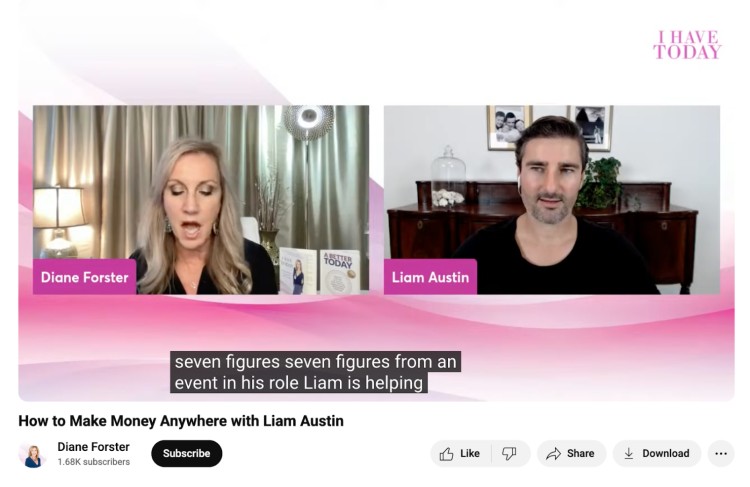
Using a podcast for business is one of the smartest ways to generate trust at scale. It’s not just content, it’s long-form connection. A place where your audience gets to hear your voice, your thinking, and your expertise.
Here’s what a podcast can do for your business:
- Bring in qualified leads.
- Build relationships with potential partners and clients.
- Give you a platform to promote offers naturally.
- Create evergreen content that drives traffic for years.
- Open doors to speaking opportunities, referrals, and collaborations.
The key is approaching your podcast with a business plan, not just a content calendar. It’s not about chasing downloads, it’s about creating a growth engine.
Podcast business model vs podcast business plan
These two terms sound similar, but they serve different purposes.
- Podcast business model: How your podcast generates revenue. This includes sponsorships, affiliate income, lead generation for offers, premium feeds, etc.
- Podcast business plan: Your overall strategy to grow your podcast. It includes your goals, your audience, your content strategy, your podcast monetization strategy, your marketing plan, metrics, and workflow.
In short:
- The model is how you make money.
- The plan is how you make it all work.
A solid podcast needs both.
Do You Need a Podcast Business Plan?
Launching a show can feel exciting on its own, but turning that show into a reliable part of your business works best with a written plan. Think of the plan as a quick-reference guide that keeps your goals, team, and budget moving in the same direction.
A podcast business plan is especially helpful when you:
- Want leads, sales, or sponsorships in addition to loyal listeners.
- Share tasks with editors, co‑hosts, or virtual assistants.
- Invest real money in gear, promotion, or production time.
- Approach potential sponsors or partners who will ask for clear numbers and strategy.
Why should you make a podcast business plan?
Most creators wing it at first… until burnout hits, bookings stall, or momentum drops. A clear business plan isn’t just about structure. It’s about long-term sustainability and smart decisions.
Here’s what most people overlook (and regret not planning for):
- It helps you say “no” to the wrong things. A solid plan gives you guardrails. You won’t waste time on guests, topics, or pitches that don’t move the needle.
- It focuses you beyond downloads. Instead of chasing chart rankings, you’ll build around leads, email growth, and authority – things that actually grow your business.
- It keeps your show running when life gets messy. A pre-built system and backup process help you stay consistent during off weeks, travel, or emergencies.
- It makes your pitch 10x stronger. Sponsors and high-level guests take you seriously when you can show them your goals, your audience, and where the show’s heading.
- It gives you clarity when things feel fuzzy. When motivation dips, your plan reminds you what matters and what you’re building toward.
Smart podcasters don’t just launch, they plan. And it shows in their results.
9 Things to Include in Your Podcast Business Plan
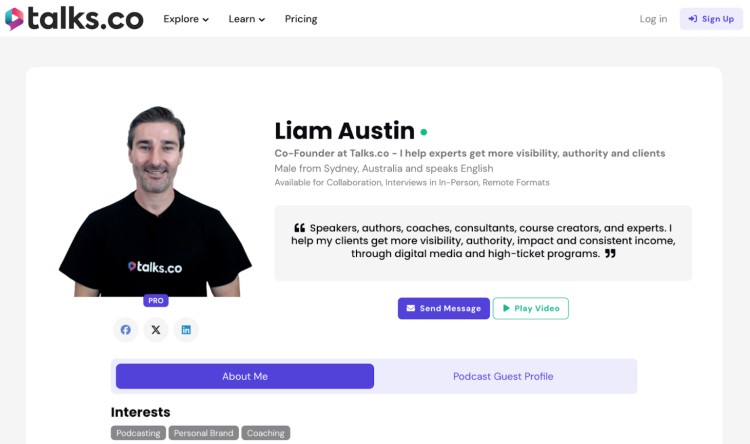
The basics, like format, niche, and monetization, are important, but they’re not the whole picture. If you want a podcast that runs like a real business, you need to think beyond the usual boxes.
Here are nine things most people forget to plan for:
- Content backlog strategy. Avoid the stress of last-minute episodes by planning how many you’ll batch before launch and how you’ll stay ahead during busy seasons or travel.
- Guest qualification criteria. Set a clear filter for who should (and shouldn’t) be on your show based on values, audience alignment, or collaboration potential, not just who’s available.
- Episode evergreen potential. Plan to create timeless content that can be reused, reshared, and repackaged over the next six to twelve months so you’re not stuck chasing trends.
- Onboarding and offboarding for guests. Map out how you’ll welcome guests (with prep materials and clear expectations) and how you’ll follow up (with assets, thank-yous, or affiliate links).
- Post-interview nurture system. What happens after a great conversation? Use a system to keep the connection warm, especially if the guest is a potential partner, client, or referral source.
- Show positioning statement. Have a one-liner that explains who your podcast is for, what it’s about, and why it matters. Useful for pitching podcast guests, sponsors, and media.
- Risk management plan. Have a backup strategy in case a guest cancels, your tech fails, or you need to take a break. A missed episode doesn’t have to derail your momentum.
- Re-engagement plan for lapsed listeners. Design email or content triggers that bring old subscribers back, especially if they haven’t listened in a while.
- Review and feedback system. Set up regular prompts to collect listener reviews, testimonials, and input. Social proof builds credibility, and direct feedback helps you improve.
These extras won’t just make your show stronger, they’ll make it sustainable. Because a podcast that grows your business shouldn’t rely on you scrambling week to week.
How to Write a Podcast Business Plan in 9 Steps
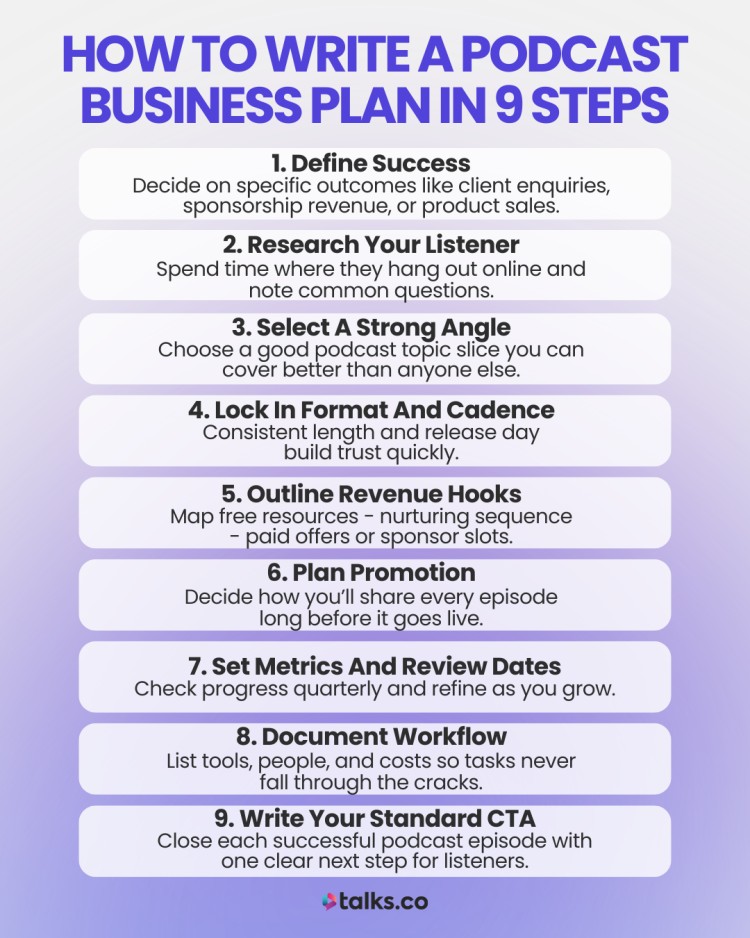
A good plan doesn’t need to be lengthy; it needs to be practical. Follow these steps to create a document you’ll actually use:
- Define success. Decide on specific outcomes like client enquiries, sponsorship revenue, or product sales.
- Research your listener. Spend time where they hang out online and note common questions.
- Select a strong angle. Choose a good podcast topic slice you can cover better than anyone else.
- Lock in format and cadence. Consistent length and release day build trust quickly.
- Outline revenue hooks. Map free resources – nurturing sequence – paid offers or sponsor slots.
- Plan promotion. Decide how you’ll share every episode long before it goes live.
- Set metrics and review dates. Check progress quarterly and refine as you grow.
- Document workflow. List tools, people, and costs so tasks never fall through the cracks.
- Write your standard CTA. Close each successful podcast episode with one clear next step for listeners.
5 Things to consider before writing a podcast business plan
Before you start filling in those sections of your podcast business, keep these factors in mind to ensure you write a business plan that reflects real‑world constraints and opportunities like any other business venture:
- Time and budget: How many hours and dollars can you commit weekly?
- Skill gaps: Editing, design, or podcast marketing strategies – what will you outsource or learn?
- Market saturation: Identify similar shows and note how you’ll differentiate.
- Offer alignment: Make sure your topic leads naturally to the product or service you sell.
- Long‑term enthusiasm: Confirm you’re happy to discuss this subject 50 episodes from now.
Addressing these points first before launching a podcast helps you craft a plan that’s realistic, motivating, and ready to support meaningful business growth.
Authority On Autoplay
With a clear step-by-step podcast business plan, every episode works overtime: boosting your authority, attracting ideal clients, and carving out space for your voice in a crowded feed.
Map out your goals, keep your workflow tight, and let your show run like a well‑tuned engine on air and in your business.
Want hosts chasing you instead of the other way round?
Talks matches experts with shows already looking for voices in your niche, so every guest spot drops you in front of ready‑to‑act listeners.
Create your free Talks creator profile and start landing bookings that bring clients, not just downloads.
